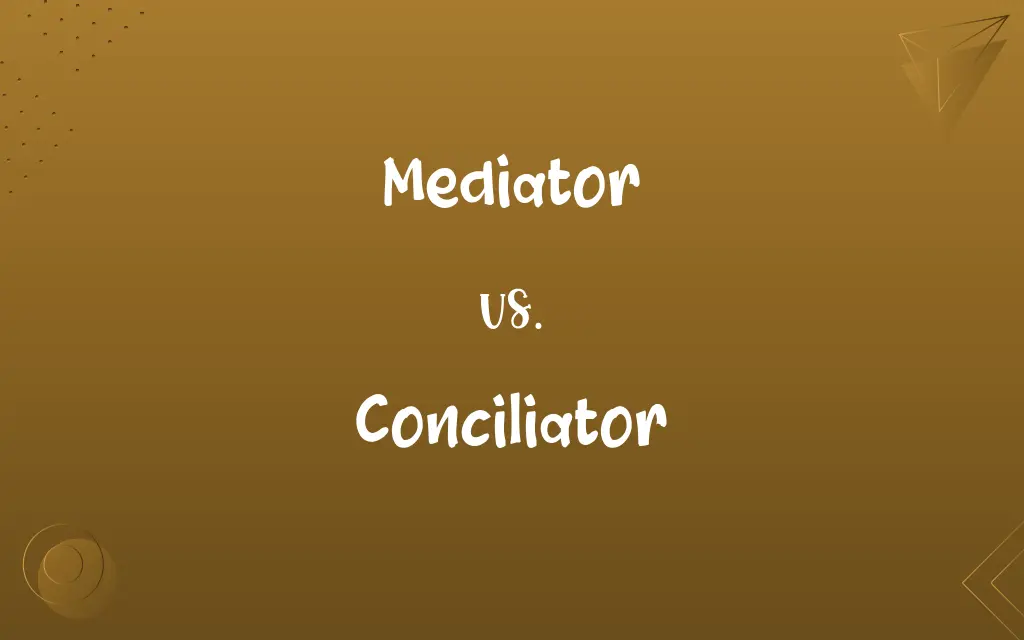Mediator vs. Conciliator: Know the Difference

By Hifza Nasir & Shumaila Saeed || Published on August 4, 2024
Mediators facilitate negotiations between disputing parties to reach a mutual agreement, while conciliators play a more active role, suggesting solutions to resolve the conflict.

Key Differences
Mediators and conciliators both aim to resolve disputes outside of court, but they employ different methods. A mediator acts as a neutral third party to help disputants find common ground and negotiate an agreement. The mediator's role is to facilitate communication, encouraging parties to discuss their issues openly and work towards a solution together. In contrast, a conciliator often takes a more hands-on approach, proposing solutions and advising parties on how to settle their dispute. This can involve meeting with each party separately to understand their positions and then bringing them together for negotiations.
Shumaila Saeed
Aug 04, 2024
Mediators focus on fostering a dialogue between the parties, allowing them to control the outcome of their negotiation, conciliators might offer opinions or suggest terms of settlement, guiding the parties towards a resolution. This difference in approach can make conciliation a faster process, but it may not always suit parties who prefer to retain full control over the resolution of their dispute.
Hifza Nasir
Aug 04, 2024
The choice between mediation and conciliation often depends on the nature of the conflict and the relationship between the disputing parties. Mediation is typically chosen for disputes where maintaining or improving relationships is a priority, as it involves active participation and collaboration from both sides. Conciliation might be preferred in situations where parties need more direction to reach an agreement or when a swift resolution is desired.
Hifza Nasir
Aug 04, 2024
Both methods offer confidentiality and aim to reach a mutually satisfactory resolution, but the mediator's non-directive role contrasts with the conciliator's more advisory or directive stance. This fundamental difference impacts how parties interact with the third party and with each other during the resolution process.
Dua Fatima
Aug 04, 2024
Both mediation and conciliation serve to prevent disputes from escalating to litigation, offering a more cost-effective and less adversarial alternative. Choosing the right approach depends on the specific needs and dynamics of the parties involved.
Shumaila Saeed
Aug 04, 2024
ADVERTISEMENT
Comparison Chart
Role
Facilitates dialogue and negotiation
Suggests solutions and advises on settlement
Shumaila Saeed
Aug 04, 2024
Approach
Non-directive, promotes open communication
More directive, may offer opinions
Hifza Nasir
Aug 04, 2024
Control
Parties retain control over the outcome
Conciliator guides towards a resolution
Shumaila Saeed
Aug 04, 2024
Interaction
Encourages direct interaction between parties
May interact with parties separately
Dua Fatima
Aug 04, 2024
Suitability
Preferred where relationship preservation is key
Useful when parties need more guidance
Hifza Nasir
Aug 04, 2024
ADVERTISEMENT
Resolution Process
Often longer, driven by parties' negotiations
Can be quicker, with conciliator's proposals
Shumaila Saeed
Aug 04, 2024
Confidentiality
Maintained throughout the process
Maintained, with a focus on finding a solution
Hifza Nasir
Aug 04, 2024
Outcome Influence
Limited, focuses on facilitating agreement
Active, can propose terms of settlement
Hifza Nasir
Aug 04, 2024
Mediator and Conciliator Definitions
Mediator
Focuses on improving dialogue without suggesting outcomes.
Through mediation, both parties felt heard and valued.
Shumaila Saeed
Feb 27, 2024
Conciliator
Takes a more active role in guiding the resolution process.
Thanks to the conciliator's guidance, a resolution was reached quickly.
Shumaila Saeed
Feb 27, 2024
ADVERTISEMENT
Mediator
Often used in disputes where ongoing relationships are important.
Mediation helped preserve their business partnership despite the dispute.
Shumaila Saeed
Feb 27, 2024
Conciliator
An advisor who proposes solutions to settle a dispute.
The conciliator suggested a compromise that addressed both parties' core concerns.
Dua Fatima
Feb 27, 2024
Mediator
Works to ensure parties arrive at their own solution.
The mediator ensured the negotiation remained balanced and fair.
Hifza Nasir
Feb 27, 2024
Conciliator
May work with parties separately to understand their positions.
After separate discussions, the conciliator crafted a proposal acceptable to all.
Dua Fatima
Feb 27, 2024
Mediator
Encourages cooperation and understanding.
Mediation fostered a sense of mutual respect between the disputants.
Hifza Nasir
Feb 27, 2024
Conciliator
Aims to accelerate the dispute resolution process.
Conciliation led to a swift and satisfactory settlement.
Shumaila Saeed
Feb 27, 2024
Mediator
A neutral facilitator who helps disputing parties negotiate a resolution.
The mediator helped them communicate more effectively to reach an agreement.
Dua Fatima
Feb 27, 2024
Conciliator
Suitable for situations needing quick resolutions.
In a time-sensitive dispute, conciliation was the preferred method.
Hifza Nasir
Feb 27, 2024
Mediator
One that mediates, especially one that reconciles differences between disputants.
Hifza Nasir
Feb 27, 2024
Conciliator
To make or attempt to make compatible; reconcile
Tried to conciliate the conflicting theories.
Hifza Nasir
Feb 27, 2024
Mediator
One who mediates; especially, one who interposes between parties at variance for the purpose of reconciling them; hence, an intercessor.
For there is one God, and one mediator between God and men, the man Christ Jesus.
Shumaila Saeed
Feb 27, 2024
Repeatedly Asked Queries
Do conciliators make decisions for the parties?
No, conciliators do not make decisions but may offer suggestions or advice to guide parties towards a mutual agreement.
Hifza Nasir
Aug 04, 2024
Is mediation or conciliation better for preserving relationships?
Mediation is often better for preserving relationships as it involves direct communication and cooperation between the parties.
Dua Fatima
Aug 04, 2024
What's the main difference between a mediator and a conciliator?
A mediator facilitates dialogue to help parties reach an agreement, while a conciliator suggests solutions and advises on settling the dispute.
Shumaila Saeed
Aug 04, 2024
Can a dispute resolution process switch from mediation to conciliation?
Yes, if mediation is not effective, parties can agree to switch to conciliation for a more directive approach.
Hifza Nasir
Aug 04, 2024
How do mediators and conciliators maintain confidentiality?
Both maintain confidentiality by not disclosing information shared during sessions and by ensuring that discussions are not used as evidence in court.
Shumaila Saeed
Aug 04, 2024
What types of disputes are suitable for conciliation?
Conciliation is suitable for disputes where parties are open to suggestions and need a quick resolution.
Dua Fatima
Aug 04, 2024
Are mediators and conciliators always neutral?
Yes, both must remain neutral and unbiased to effectively facilitate the dispute resolution process.
Shumaila Saeed
Aug 04, 2024
What happens if conciliation does not lead to an agreement?
If conciliation fails, parties may choose to resolve their dispute through arbitration, litigation, or another dispute resolution method.
Hifza Nasir
Aug 04, 2024
Can mediators offer solutions to disputes?
Typically, mediators do not offer solutions; they focus on facilitating communication so parties can develop their own solutions.
Hifza Nasir
Aug 04, 2024
What qualifications should mediators and conciliators have?
Both should have training in dispute resolution, negotiation skills, and a thorough understanding of the relevant laws and regulations.
Shumaila Saeed
Aug 04, 2024
Is a resolution reached through mediation or conciliation legally binding?
Resolutions can be made legally binding if both parties agree and the terms are documented in a contract or settlement agreement.
Hifza Nasir
Aug 04, 2024
Can mediation or conciliation be used in any type of dispute?
While most suitable for civil, commercial, and family disputes, their appropriateness depends on the specifics of each case.
Hifza Nasir
Aug 04, 2024
Why choose mediation over conciliation, or vice versa?
The choice depends on the dispute's nature, the relationship between the parties, and whether a more guided or collaborative approach is desired.
Shumaila Saeed
Aug 04, 2024
Do parties need to accept a conciliator's proposal?
No, parties are not obligated to accept a conciliator's proposal if it does not meet their needs or interests.
Dua Fatima
Aug 04, 2024
How long do mediation and conciliation processes typically last?
The duration varies based on the complexity of the dispute, with mediation potentially lasting longer due to its collaborative nature.
Shumaila Saeed
Aug 04, 2024
Share this page
Link for your blog / website
HTML
Link to share via messenger
About Author
Written by
Hifza NasirCo-written by
Shumaila SaeedShumaila Saeed, an expert content creator with 6 years of experience, specializes in distilling complex topics into easily digestible comparisons, shining a light on the nuances that both inform and educate readers with clarity and accuracy.








































































